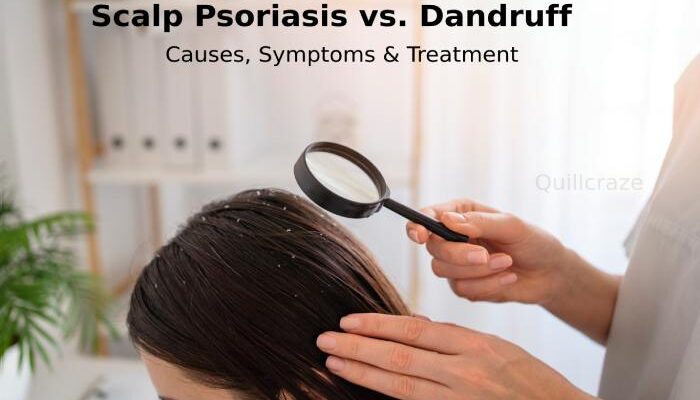When you have a flaky, scaly scalp, it can be hard to diagnose dandruff and a more serious condition like psoriasis. Considering the causes, symptoms, and treatments for these two scalp disorders, they can look and be relatively similar. This comprehensive guide will help you understand these differences and guide you on how to manage both conditions effectively.
Understanding Psoriasis Sclap
Psoriasis is a chronic autoimmune condition that can affect various parts of the body, including the scalp. Unlike dandruff, which is caused by environmental or fungal factors, psoriasis stems from a malfunction in the immune system. This triggers the rapid turnover of skin cells, leading to thick patches and scaling. Scalp psoriasis may be confused with dandruff because of the flaking, but it presents several key differences:
- Autoimmune Disease:In psoriasis, the immune system mistakenly accelerates the growth of skin cells, causing them to build up into thick, silvery patches. It’s not just limited to the scalp; psoriasis can affect any part of the body, such as the knees, elbows, and back.
- Hereditary Factor: Psoriasis tends to run in families. If you have relatives with psoriasis, your risk increases.
- Trigger Factors: Psoriasis flare-ups can be triggered by stress, infections, cold weather, injury to the skin, and certain medications.
Symptoms of Psoriasis
- Thick, silvery-white scales on the scalp that can extend beyond the hairline.
- Red patches of skin that can become inflamed, painful, and itchy.
- Severe itchiness that is often more intense than dandruff.
- Psoriasis can also cause scalp bleeding if the plaques are scratched excessively.
Causes of Psoriasis
Psoriasis is believed to be triggered by a combination of genetic and environmental factors. It is not contagious, and its onset can be triggered by:
- Immune system dysfunction
- Genetics (family history of psoriasis)
- Stress
- Infections, such as strep throat
- Cold, dry weather
- Certain medications
Managing Psoriasis
- Topical Treatments: Steroid-based creams or ointments can help reduce inflammation and flaking. These are often prescribed for mild to moderate cases.
- Medicated Shampoos: Similar to dandruff treatments, shampoos with salicylic acid, coal tar, or other medicated ingredients may be used. However, psoriasis often requires stronger solutions, sometimes in combination with other treatments.
- Phototherapy: Ultraviolet (UV) light therapy is effective for some patients with psoriasis, helping slow down skin cell turnover.
- Systemic Treatments: In more severe cases, oral or injectable medications may be prescribed to target the immune system and reduce flare-ups.
Understanding Dandruff
Dandruff is one of the most common scalp conditions, affecting millions worldwide. It is primarily characterized by flaking and mild itching but doesn’t usually indicate a serious health issue. Dandruff can be caused by multiple factors:
- Seborrheic Dermatitis: A common cause of dandruff, it affects the oily areas of the body, including the scalp. It results in red, greasy skin covered with flaky white or yellow scales.
- Dry Skin: During cold weather or due to environmental factors, dry skin can lead to scalp flaking. This type of dandruff tends to produce smaller, less oily flakes.
- Malassezia: A yeast-like fungus naturally found on the skin. In some people, this fungus can cause irritation, leading to an overproduction of skin cells that results in flaking.
- Hair Products and Sensitivity: Certain shampoos, conditioners, or styling products can irritate the scalp, resulting in contact dermatitis and dandruff-like symptoms.
Symptoms of Dandruff
- Small, loose white or yellow flakes of skin.
- Flaking primarily concentrated on the scalp.
- Mild to moderate itching.
- More visible flaking when hair is not washed frequently or during dry, cold weather.
Causes of Dandruff
Dandruff can be triggered by a variety of factors, most of which are related to scalp health:
- Oily skin or infrequent shampooing
- Dry skin
- Fungal infections (Malassezia overgrowth)
- Sensitivities to hair care products (contact dermatitis)
- Cold weather and dry indoor conditions
Managing Dandruff
- Use Medicated Shampoos: Look for shampoos containing ingredients like ketoconazole, selenium sulfide, zinc pyrithione, or coal tar, which can effectively reduce dandruff.
- Moisturize the Scalp: Regularly moisturizing the scalp can help prevent dryness.
- Avoid Harsh Products: Minimize the use of styling products or shampoos with harsh chemicals that may worsen irritation.
How to Differentiate Between Psoriasis and Dandruff
The visible symptoms of both conditions can overlap, but some signs point to psoriasis rather than dandruff:
- Severity of Itching: If you’re experiencing more severe itching and even pain, it may be psoriasis.
- Red, Inflamed Patches: Dandruff doesn’t usually cause large red patches of inflamed skin, whereas psoriasis does.
- Plaques that Bleed: Scratching psoriasis can lead to bleeding, which is not typically seen with dandruff.
Treatment Approach for Both Conditions
For Dandruff:
- Medicated Shampoos – Use products that contain active ingredients like pyrithione zinc or selenium sulfide.
- Diet and Hydration – Staying hydrated and maintaining a healthy diet can improve scalp health.
- Avoiding Triggers – Limiting the use of harsh hair care products can help reduce irritation.
For Psoriasis:
- Topical Corticosteroids – These can help reduce inflammation and control flare-ups.
- Salicylic Acid Shampoos – These are effective at removing scales and reducing plaques.
- Phototherapy – Using controlled UV light exposure can reduce the rate of skin cell production.
- Biologic Medications – These target the immune system to reduce severe cases of psoriasis.
When to See a Dermatologist
For both conditions, if symptoms persist despite treatment or significantly impact your quality of life, consult a dermatologist. Psoriasis, especially, may require long-term management strategies and can be associated with other health conditions such as psoriatic arthritis.
FAQs about Psoriasis vs. Dandruff
- Can dandruff turn into psoriasis?
No, dandruff and psoriasis are distinct conditions. Dandruff is usually caused by dry skin or fungus, while psoriasis is an autoimmune disease. However, they can occur simultaneously on the scalp. - Can I use the same shampoo for both dandruff and psoriasis?
Some medicated shampoos may be effective for both conditions, particularly those containing salicylic acid or coal tar. However, psoriasis often requires more aggressive treatment. - Is scalp psoriasis contagious?
No, psoriasis is not contagious. It is an autoimmune condition and cannot be transmitted from person to person. - How do I know if I have dandruff or psoriasis?
Dandruff typically causes loose, white flakes, while psoriasis results in thicker, silver scales and red patches on the scalp. Psoriasis also tends to be more painful or itchy. - Can stress cause dandruff or psoriasis flare-ups?
Yes, stress can trigger both dandruff and psoriasis flare-ups. Managing stress through relaxation techniques and a healthy lifestyle can help in reducing symptoms. - Can psoriasis cause hair loss?
Yes, while psoriasis itself doesn’t cause hair loss, the scratching and inflammation associated with it can lead to temporary hair thinning. - Can I have both dandruff and psoriasis at the same time?
Yes, it’s possible to have both conditions concurrently, as they are triggered by different factors. A dermatologist can help determine the most effective treatment approach. - Is there a cure for scalp psoriasis?
There is no permanent cure for psoriasis, but it can be managed with appropriate treatment. Many people experience long periods of remission with proper care. - Can lifestyle changes help manage these conditions?
Yes, lifestyle factors like managing stress, improving your diet, and using the right skincare products can significantly help in managing both dandruff and psoriasis.
Conclusion
Although psoriasis and dandruff share some similar symptoms, they are different conditions that require different treatments. Understanding the causes and symptoms of each can help you determine the best course of action for managing your scalp health. If you’re unsure about which condition you’re dealing with, a consultation with a healthcare provider or dermatologist is essential.




